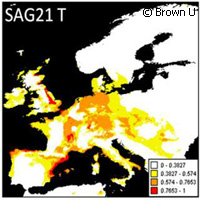How genetic flexibility spurs plant survival vis-à-vis climate change
Climate change is impacting the world at large, but just how well the planet's organisms adapt to these changes may be a determining factor in how they can meet the challenge to survive. In a new study, scientists in Austria and the United States say genetics could play a pivotal role in how the Arabidopsis thaliana plant responds to such changes. Presented in the journal Science, the study could help find the molecular basis for other plants' adaptability to climate change too. Compared to animals, plants are at a disadvantage when climate change enters the picture: plants cannot move. But scientists led by Brown University in the United States observed that plants are not completely without their own ammunition that may give them the boost they need to survive. Investigating the common European plant A. thaliana, the researchers identified the genetic signature that governs this plant's fitness (i.e. ability to survive and reproduce) in a range of climates. The suite of genes passed on to Arabidopsis is impacted by the climate; this effectively determines how the plant optimises its survival and reproduction prowess. According to the scientists, the set of genes determining fitness varies depending on the conditions of the climate in the plant's region: cold, warm, dry, wet or otherwise. 'This is the first study to show evolutionary adaptation for Arabidopsis thaliana on a broad geographical scale and to link it to molecular underpinnings,' says co-author Johanna Schmitt, head of the Environmental Change Initiative at Brown University. 'Climate is the selective agent.' 'There is still evolutionary flexibility to help plants take one direction or another,' explains lead author Alexandre Fournier-Level, a postdoctoral researcher at Brown University. 'It gives us good hope to see, yes, it's adapting.' Commenting on the study's finding, Dr Amity Wilczek of Deep Springs College in the United States, a co-author of the study, says: 'This was a truly massive undertaking, tracking more than 75,000 plants in the field, from near the Arctic Circle to the Mediterranean coast. Arabidopsis is an annual plant, so we could measure total lifetime success of an individual within a single year. We gathered plants from a variety of native climates and grew some of each in our four widely distributed European garden sites. We shipped our harvested plants back to Brown and began the laborious task of counting fruits on these plants. In the end, we were able to assemble a very large and comprehensive data set that gives us new insight into what it takes for a plant to be successful in nature under a broad range of climate conditions.' Identifying the molecular mechanisms that may give Arabidopsis the genetic flexibility to meet climate challenges could help clarify how climate may trigger the re-engineering of the genetic profiles of other plants. Experts from the Gregor Mendel Institute at the Austrian Academy of Sciences contributed to this study.For more information, please visit: Science:http://www.sciencemag.org/Gregor Mendel Institute:http://www.gmi.oeaw.ac.at/Brown University:http://www.brown.edu/
Countries
Austria, United States



